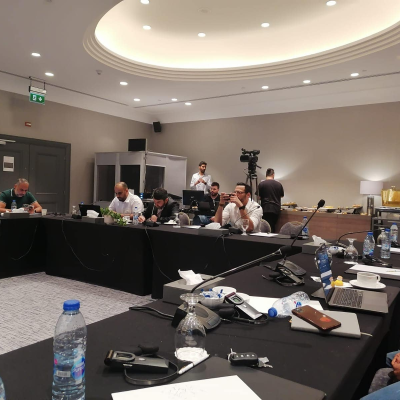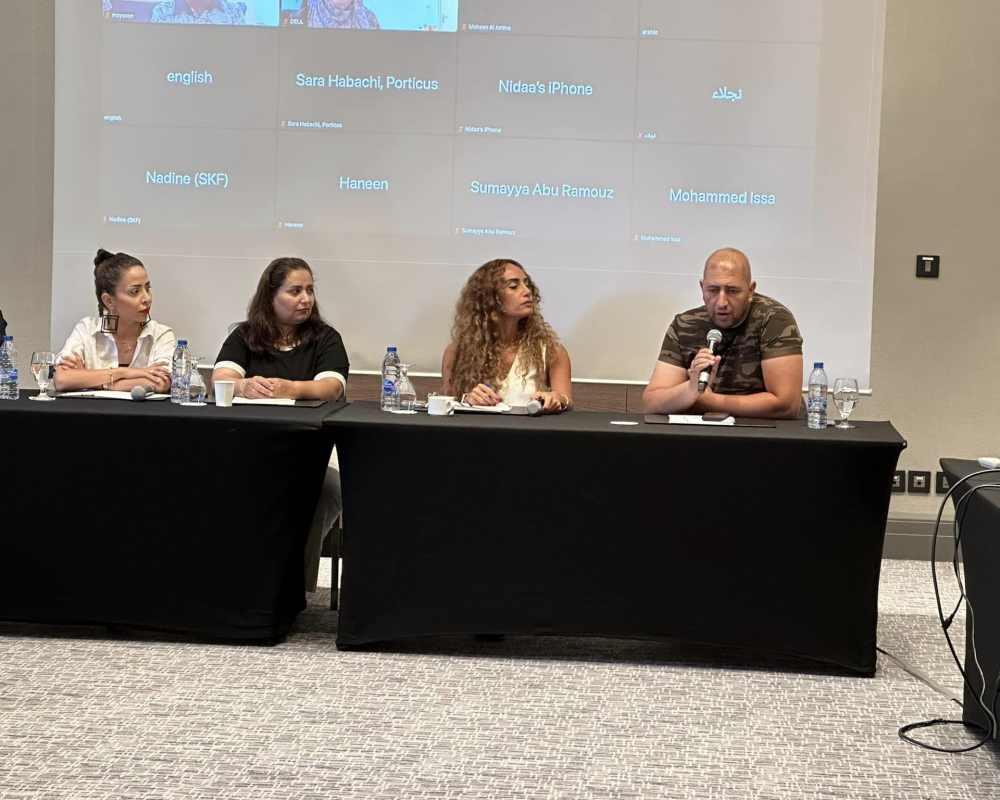
Amman/PNN/
As part of its efforts to develop independent media in Arab countries, and within its programs in this context, the Samir Kassir Foundation organized a media seminar in the Jordanian capital, Amman, with the participation of directors and representatives from Palestinian, Lebanese, and Jordanian media outlets, under the title "Trust in Journalism Initiative" (JTI).
From Palestine, directors of institutions such as the Palestinian News Network (PNN), Radio Bethlehem 2000, Radio Ilam, and the Telegraph website from the West Bank, as well as Dunya Alwatan and Al-Bawaba 24 from the Gaza Strip, participated in the conference via video conference due to their inability to attend in person. Jordanian and Lebanese media institutions also participated.
Samir Kassir Foundation Organizes Media Symposium on the Importance of JTI Certification
The conference and seminar, held at the Intercontinental Hotel in Amman, began with a welcoming speech by Wael Akiki from the Samir Kassir Foundation, who spoke about the efforts of the foundation and its programs to develop media in Arab countries, emphasizing capacity-building programs within these institutions.
Akiki pointed out that the meeting in Amman aims to introduce the JTI initiative, which is an initiative by Reporters Without Borders to provide media outlets with a certificate equivalent to the ISO international quality certificate, in order to enhance their editorial, managerial, and financial capacities, as well as promote transparency and good governance. This will contribute to enhancing their professionalism and independence, transforming them into media outlets that serve society.
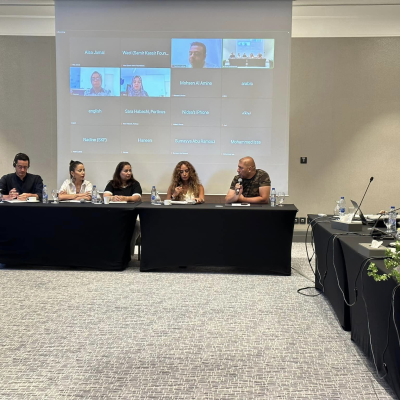
Akiki further explained that the workshop included an explanation of the JTI initiative, presented by Bertrand Moussiat from the JTI team, followed by a panel discussion titled "Towards Media Governance in the Digital Age: Do Traditional and Digital Media Apply the Same Laws and Regulatory Rules?"
Akiki also mentioned that the Samir Kassir Foundation for Media Freedoms works on improving the standards of media institutions through any initiative that strengthens independent media institutions, emphasizing the importance of the JTI initiative.
JTI Initiative Shines Spotlight on Professionalism and Transparency in Arab Media Industry
Bertrand Moussiat, Director of Communication and Development at JTI, a part of Reporters Without Borders, presented an overview of the initiative. Reporters Without Borders is an organization established 30 years ago to defend journalists, press freedom, and develop media institutions. They have main offices in several countries around the world.
Moussiat also discussed the Trusted Journalism Initiative, which aims to identify professional and trustworthy media institutions operating in the news industry. He emphasized the importance of being reliable and adhering to the ISO specifications system, which is based on principles and a set of criteria to create the best standards. These standards were developed in partnership with media experts from around the world, including journalists and editors-in-chief who laid the foundation for the initiative. The idea behind the initiative is to establish completely reliable standards based on the ISO system.
He pointed out that work on the specifications continued for a year and a half, during which excellent information and specifications were developed to present the initiative in the best possible way. In the current media landscape, characterized by the proliferation of news, films, and programs, with a growing presence of advertisements, government, partisan, and commercial media, the initiative aims to provide reliable information.
Moussiat also highlighted that the initiative is based on principles of transparency, an ethics document, and professional journalism. It was developed by 130 experts, and after this effort, it was submitted to the International Organization for Standardization (ISO) under the name JTI. The idea was accepted by ISO after this effort.
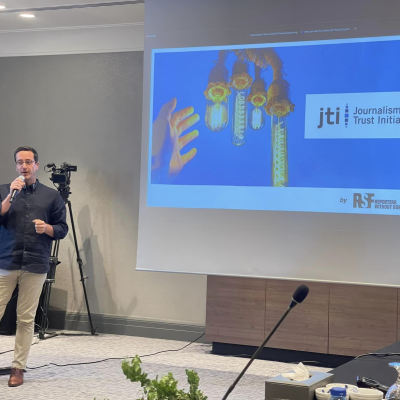
Regarding the impact of obtaining the JTI certificate, he stated that it provides media outlets with better economic and professional opportunities, as well as a reputable and trusted reputation among the public.
Regarding the application and registration process for the certificate, Moussiat mentioned that it involves multiple steps, consisting of 18 sections and answers to 130 questions about the media outlet's identity, ownership, editorial policy, transparency, independence, whether the documents are written, and if there is a decision-making system through meetings. It also includes whether there is a policy to combat conflicts of interest and if the media outlets disclose advertisements and paid programs to the public, ensuring that the audience is aware of their sponsored nature. Additionally, it allows for public feedback, reflecting the importance of professional, transparent, and ethical journalism.
He also called on all representatives of media outlets partnering with the Samir Kassir Foundation to apply for the initiative and document their media platforms. He expressed confidence that positive results will benefit them, as JTI seeks to engage with donors and professional media institutions that combat misleading information, so that certified JTI institutions can be recognized as reliable news sources.
Moussiat mentioned that the JTI certificate will serve as a helpful tool to inform funders that they can redirect their support to trustworthy institutions. JTI also collaborates with social media platforms to develop algorithms and connect them with institutions that have obtained the JTI certificate. This means a wider and larger dissemination of content once the certificate is adopted, leading to an improved reputation for these institutions, which will have financial implications.
He explained the working mechanisms for registration, where the submission of information is followed by a review and adjustment period.
With PNN's participation: Seminar on the registration experience for the initiative
Following the first session, an open dialogue seminar was organized, presented by five journalists with experience in applying for the initiative. They included Widad Jarbou', a journalist and researcher at the Samir Kassir Foundation; Manjad Jadu, Director of the Palestinian News Network (PNN); Ataf Ruwadan, a journalist at AmmanNet Radio; Ghada Al-Sheikh, a journalist from Al-Ghad newspaper in Jordan, and Bertrand Moussiat, Director of Communication and Development from the JTI team.
Managed by journalist Widad Jarbou', the media seminar discussed the importance of the JTI initiative regarding media and journalistic governance, as well as its significance and impact on the sustainability of media institutions and the transparency of their content.
Jarbou' focused on the effects of governance on the sustainability and development of media institutions, sharing the experiences and work of the speakers and their respective media organizations.

Munjad Jadou, from the Palestinian News Network (PNN), discussed PNN's experience in applying for the initiative, emphasizing that it opened the way for the network to enhance its work within a clear system based on governance principles in all aspects of journalism. He believed that governance is essential for the development of media institutions, as it establishes a system that governs everything within the organization, serving as a reference for administrative, financial, editorial, and transparent aspects of work. Jadu also highlighted the importance of improving work standards based on governance, adopting policies of transparency, professionalism, and independence in performance for anyone aiming to build a strong media institution.
Jadou noted that the experience is not easy but promising, inspiring determination to progress and obtain the certification soon. He also addressed the participants' questions regarding the reality of independent media, the regulations governing their work, the proposed laws and concerns raised by media owners about certain provisions and regulations that could restrict professional journalism. He discussed the challenges and exploitation attempts faced by journalists and media outlets in Palestine, whether from the private sector, companies, or even donors who try to impose their agendas or conditions on Palestinian media.
Jadou appreciated the efforts and partnership of the Samir Kassir Foundation with PNN and several other media institutions in Palestine, Jordan, and Lebanon.
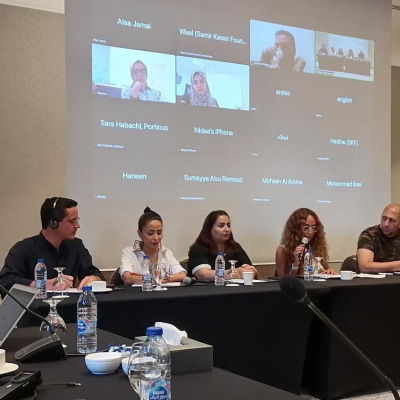
Ettaf Ruwadan, a Jordanian journalist working at AmmanNet Radio "Radio Al-Balad," the first Arab media organization to obtain the JTI certificate, emphasized the importance of the certification on multiple levels, both internally within the institution and externally in front of the audience and donors. She expressed that every individual in the radio station feels proud to have received this certification, as it distinguishes them from other media outlets in terms of governance, transparency, and integrity. It also educates and informs readers and listeners about the differences between professional and non-professional media, serving as a significant advantage. She urged everyone to apply for this certificate, for which the radio station and its management have worked diligently for a long time.
Ruwadan emphasized that it is important to have a decision within the institution to establish a comprehensive governance system that adheres to standards enhancing the transparency and sustainability of media institutions.
Ghada Al-Sheikh, a journalist from Al-Ghad newspaper in Jordan, spoke about the importance of developing independent and professional Arab media, drawing from her experience in various media outlets. She also highlighted the steps needed to establish a comprehensive governance framework and its application to all types of media.
She pointed out the problem of media chaos in the age of social media, which was meant to be a tool for raising people's voices but has sometimes turned into a tool for chaos due to its misuse.
In conclusion, the participants answered questions from the attendees, which revolved around the development and changes in the media sector and their impact on work, the increasing influence of social media platforms and influencers, and their impact on professional journalism, as well as the proposed laws in the participating countries and the importance of benefiting from successful independent media experiences.
It's worth noting that representatives from media outlets in Lebanon, Jordan, and Palestine participated in the seminars and conference, while some joined via video conference, particularly from the Gaza Strip, as they were unable to attend due to the Israeli blockade.
